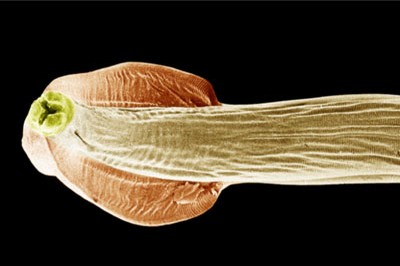Roundworms are a common parasitic concern for pet owners, particularly those with dogs. These intestinal worms are frequently found in puppies and can be transmitted in various ways, making them prevalent and persistent. While roundworms are known to affect our furry companions, a significant question arises for pet owners: Can Humans Get Roundworms From Pets? This article delves into the risks of roundworm transmission from pets to humans, exploring how it happens, the potential health impacts, and crucial preventative measures to protect both yourself and your beloved animals.
Roundworms, scientifically known as ascarids, are internal parasites that reside in the intestines of dogs and cats. They are characterized by their long, cylindrical, and whitish or light brown appearance, often resembling spaghetti. Dogs can become infected with roundworms through several routes. One of the most common is transplacental transmission, where puppies acquire the worms from their mother before birth. Post-birth, puppies and dogs can ingest roundworm eggs from contaminated environments, consume larvae in their mother’s milk, or by eating infected intermediate hosts like rodents.
How Roundworms Affect Dogs: Symptoms and Signs
Adult roundworms live within a dog’s intestines, often without causing noticeable symptoms, especially in adult dogs with milder infestations. However, significant roundworm infections, particularly in vulnerable puppies, can lead to a range of health issues. Common symptoms in dogs include diarrhea, vomiting, weight loss despite a normal or increased appetite, and a dull coat. A characteristic sign of roundworm infestation is a pot-bellied appearance, especially in puppies. In some cases, if larvae migrate to the lungs, dogs may also exhibit coughing. Pet owners might even observe adult roundworms in their dog’s feces or vomit, which appear as white or light brown worms, sometimes several inches in length.
Zoonotic Risk: Roundworms and Human Health
The question “can humans get roundworms from pets?” is not just a matter of curiosity but a valid health concern. Roundworms are zoonotic parasites, meaning they can be transmitted from animals to humans. Humans can become infected with roundworms primarily through accidental ingestion of roundworm eggs found in contaminated soil or animal feces. This can occur through various activities, such as gardening, playing in parks or sandboxes, or even just through inadequate hand hygiene after touching potentially contaminated surfaces.
Once ingested, roundworm eggs hatch into larvae in the human intestine. Unlike in dogs, roundworms cannot mature into adult worms and complete their life cycle in humans. Instead, the larvae migrate through the body tissues, a condition known as visceral larva migrans (VLM). In some cases, larvae may migrate to the eye, causing ocular larva migrans (OLM), which can lead to visual impairment and even blindness. While less common, roundworm larvae migration can also affect other organs, including the lungs, heart, and brain, leading to various health problems. Children are particularly vulnerable to roundworm infection due to their tendency to play outdoors and have less developed hygiene habits.
Prevention Strategies: Protecting Pets and People
Preventing roundworm infections in pets and humans involves a multi-faceted approach focused on hygiene and preventative care for animals. Maintaining a clean environment for pets is crucial. Regularly removing dog feces from yards and living areas significantly reduces the risk of environmental contamination with roundworm eggs. Preventing dogs from scavenging and consuming wild animals, which can act as intermediate hosts for roundworms, is also important.
For puppies, early and consistent deworming is vital to eliminate roundworms acquired from their mothers. Veterinarians typically recommend deworming puppies at 2, 4, 6, and 8 weeks of age, followed by monthly preventative treatments. Regular fecal examinations, two to four times in the first year and annually for adult dogs, are also recommended to monitor for and address parasitic infections. Nursing mothers should also receive monthly preventative treatment to minimize transmission to their puppies.
For human prevention, practicing good hygiene is paramount. Thorough handwashing with soap and water after any contact with soil, pet feces, or animals is essential, especially for children. Children should be discouraged from playing in areas where animal feces are present. When gardening or working in soil, wearing gloves can provide a protective barrier against potential contamination.
Many heartworm preventatives for dogs also include protection against roundworms. Consulting with a veterinarian is crucial to determine the most appropriate preventative and treatment strategies for your dog, considering their individual risk factors and lifestyle. By understanding the risks and implementing effective preventative measures, pet owners can significantly reduce the chance of roundworm transmission, ensuring the health and well-being of both their pets and their families.
For more in-depth information for veterinary professionals, please visit the Companion Animal Parasite Council (CAPC) guidelines on ascarids: https://www.capcvet.org/guidelines/ascarid/.

